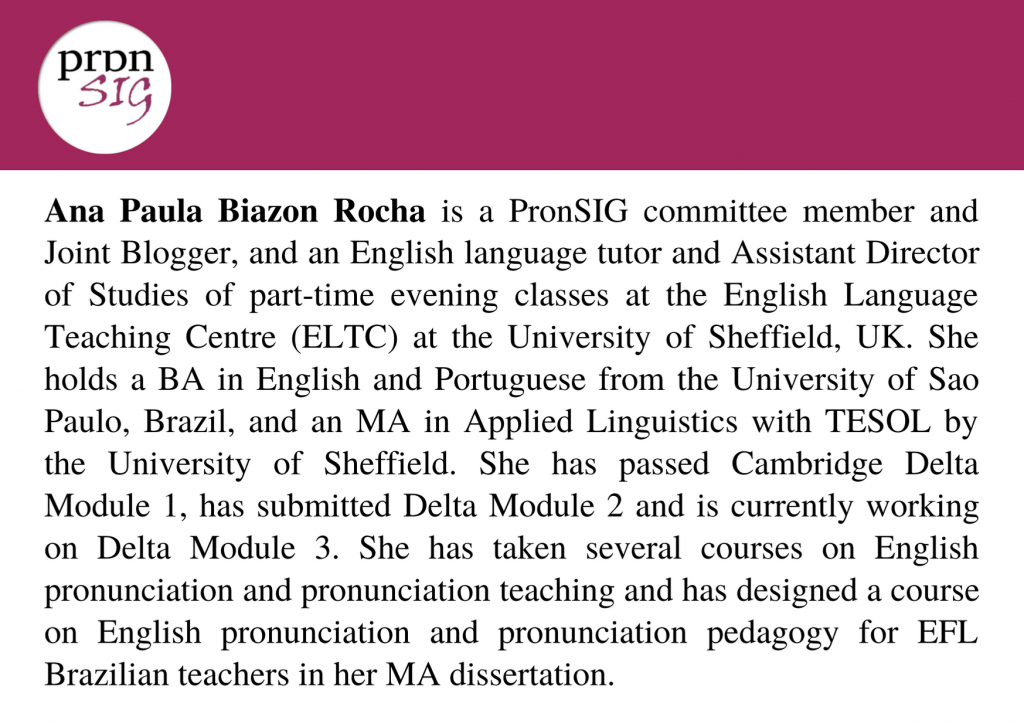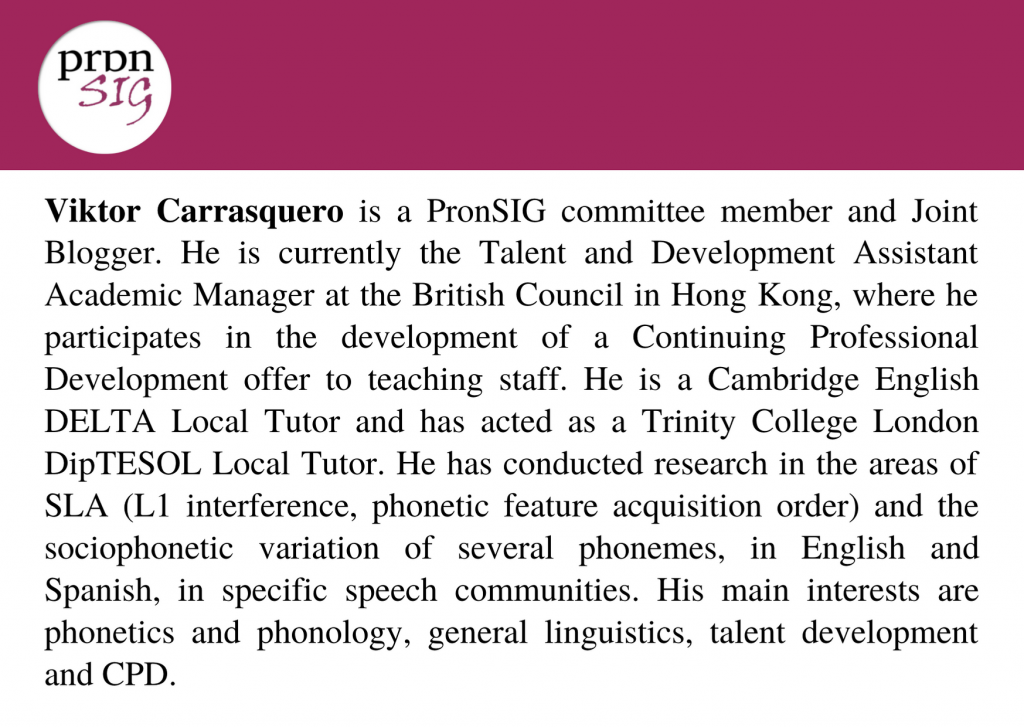by Ana Paula Biazon Rocha and Viktor Carrasquero
The 56th IATEFL International Conference is approaching (18th to 21st April 2023). As we wait for the event of the year, join our Pre-Conference Event, set to take place on Monday, 17th April. For the second year in a row, the event will be hybrid, which means that you can join us in person, in Harrogate, or online, from anywhere in the world. The hybrid nature of the event will allow our global community to come together, to discuss pronunciation teaching and to network with like-minded professionals. Click here to learn more about the event and to register.
This year, PronSIG joins forces with TDSIG to tackle some of the most common fears that teachers have around working with pronunciation in the English language classroom. The four speakers of our pre-conference event approach the subject with enthusiasm and vulnerability, exploring teachers’ attitudes as they develop their pronunciation teaching knowledge and practices (Michael Burri), showing ways in which greater knowledge of phonological theory can boost practitioners’ confidence in the pronunciation classroom (Catarina Pontes), discussing how an enhanced knowledge of prosody influences teachers’ confidence (Isabella Fritz and Sandra Kotzor), and challenging commonly-held beliefs and misconceptions (Mark Hancock).
So, here’s a brief introduction to our PCE speakers:
1. Michael Burri
Our first speaker of the day, Burri is a researcher and practitioner with extensive experience in the fields of second language teaching and teacher education. He is currently a Senior Lecturer in TESOL at the University of Wollongong, and we are especially excited to have him in our PCE because of the body of work he has on how teachers of English as an additional language develop their teaching skills. A quick look into his publications reveals his predilection for the teaching of pronunciation. Burri’s session (with William Acton) on our 2021 PronSIG Online Conference, on how pronunciation teaching can be enhanced through touch, both physically and metaphorically, was extremely interesting and practical. By the way, Burri has highlighted that his workshop explores some of his findings in the “first study that follows pronunciation teachers over several years”. We can’t wait to see what his workshop has in store this year!
2. Catarina Pontes
A well-known and respected teacher trainer in Brazil’s English Language Teaching context, Pontes has been teaching for about 25 years and is one of PronSIG’s former coordinators. She focuses on building teachers’ confidence by helping them with formal knowledge on phonology and with how to implement practical pronunciation activities in the classroom. Pontes firmly believes that pronunciation teaching can and should be fun, so there is no need to fear it! Along with Vinicius Nobre, she has published Getting into teacher Education: a Handbook (2016, Cengage Learning, Portuguese), which helps experienced teachers start their path into teacher training. She has already taken part in many PCEs with PronSIG: “Attending the PCE is a great opportunity to network, learn from peers and channel the discussion towards the same interests. I have learned a lot in the past from attending PCEs and have made great friends, too!” She’s also excited about her session this year: “We are going to talk about reasons why teachers tend to shy away from pronunciation teaching, look at ways in which we can embrace this challenge and find out how we can both grow professionally and help learners to communicate better!”
3. Isabella Fritz and Sandra Kotzor

Fritz and Kotzor are psycholinguists whose research is based at the University of Oxford, UK. They focus on the effects of prosodic features, investigating how our perception of stress patterns in our L1 informs and/or influences us when processing L2 stress patterns. They are engaged in a pivotal task in our field: bringing research and teaching together. Their presentation ‘Crocodile or Kroko’dil: effects of stress differences on second-language processing’ was really successful at PronSIG’s annual online conference in 2021, and last year, Fritz wowed us with her session ‘Category analysis: navigating English stress’ during PronSIG’s Showcase Day in Belfast. In Fritz and Kotzor’s words: “we are looking forward to talking about phonological knowledge and how that can help in teaching pronunciation – especially when it comes to the teachers’ confidence in doing so. For us, PronSIG’s PCE is a great opportunity to bridge our experimental and theoretical research with classroom practices”.

4. Mark Hancock
One of our community’s pronunciation teaching communicators par excellence, Hancock’s publications have been a staple in our field over the years, and his enthusiasm for sharing his knowledge with teachers everywhere brings him once again to our PCE. Some of his core publications, such as Pronunciation Games (CUP, 1995) and English Pronunciation in Use (CUP, 2017), the PronPack Series (2017, Hancock McDonald ELT), or the more recent 50 Tips for Teaching Pronunciation (CUP, 2020), undoubtedly support us when teaching pronunciation. For his workshop this year, Hancock encourages participants to reflect, stating: “Some of us, I suspect, avoid teaching pronunciation for fear we’re not good enough. What will they think of my accent? I can almost hear their laughter all the way from Oxford! But who are these imaginary beings who sit there in judgment of the way we speak? They are the accent police, my friend, and they’re inside your head!”
As you can see, our PCE will be an excellent opportunity to learn from and share with amazing speakers who definitely understand what we English teachers go through and inspire us to believe in our teaching knowledge and skills when it comes to pronunciation.
Don’t forget to leave your comments below, check our previous blog posts about Pronunciation Teaching and follow PronSIG on social media.



